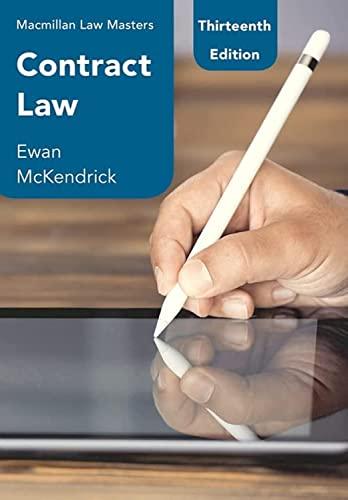Question
The question is : The current state of the law is that Coroner's inquests do not comment on fault or guilt.Do you agree with that?Should
The question is : The current state of the law is that Coroner's inquests do not comment on fault or guilt.Do you agree with that?Should this be changed?Why or why not?
Details
The importance of the Coroners Act (R.S.O. 1990, Chapter C.37) to OHS can not be underestimated. The enactment of "Bill 186" that recently amended the OHS Act is a testimony to this fact.
Lori Dupont, a nurse at Hotel Dieu Hospital was stabbed to death by her ex-boyfriend who worked in the same hospital in 2005. Recommendations from the Coroner's inquest into her death eventually led to "Bill 186" amendment of the OHS Act.
Section 17 (2) of the Coroners' Act provides for investigation and inquest. Section 18 (2) provides for recommendations with respect to the prevention of death in circumstances similar to those of the death that was subject of the coroner's investigation.
The Act provides for "Coroner's report if death suspected not natural causes" and "Determination to hold an inquest." Most workplace fatalities naturally fall under section 18.1 of the Act. This will bring OHS directly under the Coroners' Act.
Coroners have investigative powers and may delegate such powers to a legally qualified medical practitioner or a police officer (s. 16 (3)).A Coroner's inquest is public and, like a regular court trial, have the support of a jury. Typically, five jurors work with the Coroner on an inquest.
You should note that the jury in a Coroner's inquest does not have the power to apportion fault or blame for the death but can make recommendations to prevent similar events leading to the death in the future. Example of that are recommendations out of Lori Dupont's case discussed above.
Like a court proceeding, a public Coroner's inquest must be orderly. The Coroner has the powers to maintain order at his inquest. He also has peace officers to enforce orders given
R.S.O. 1990, Chapter C.37
Coroner's report if death suspected not of natural causes
18.1If the coroner is of the opinion, based on his or her investigation, that the deceased person may not have died of natural causes, the coroner shall advise the regional coroner of that opinion and the regional coroner shall so advise the Crown Attorney.
Determination to hold an inquest
19.Where the coroner determines that an inquest is necessary, the coroner shall,
(a) forthwith notify the Chief Coroner of that determination and give the Chief Coroner a brief summary of the results of the investigation and of the grounds upon which the coroner made that determination; and
(b) hold an inquest
Purposes of inquest
31.(1)Where an inquest is held, it shall inquire into the circumstances of the death and determine,
(a) who the deceased was;
(b) how the deceased came to his or her death;
(c) when the deceased came to his or her death;
(d) where the deceased came to his or her death; and
(e) by what means the deceased came to his or her death.
Idem
(2)The jury shall not make any finding of legal responsibility or express any conclusion of law on any matter referred to in subsection (1). R.S.O. 1990, c.C.37, s.31(2).
Authority of jury to make recommendations
(3)Subject to subsection (2), the jury may make recommendations directed to the avoidance of death in similar circumstances or respecting any other matter arising out of the inquest
Inquest public
32.An inquest shall be open to the public except where the coroner is of the opinion that national security might be endangered or where a person is charged with an indictable offence under the Criminal Code (Canada) in which cases the coroner may hold the hearing concerning any such matters in the absence of the public.
Juries
33.(1)Every inquest shall be held with a jury composed of five persons. R.S.O. 1990, c.C.37, s.33(1); 2009, c.15, s.19 (1).
Jurors
(2)The coroner shall direct a constable to select from the list of names of persons provided under subsection 34(2) five persons who in his or her opinion are suitable to serve as jurors at an inquest and the constable shall summon them to attend the inquest at the time and place appointed. R.S.O. 1990, c.C.37, s.33(2).
Idem
(3)Where fewer than five of the jurors so summoned attend at the inquest, the coroner may name and appoint so many persons then present or who can be found as will make up a jury of five.
List of jurors
34.(1)A coroner may by his or her warrant require the sheriff for the area in which an inquest is to be held to provide a list of the names of such number of persons as the coroner specifies in the warrant taken from the jury roll prepared under the Juries Act.
Maintenance of order at inquest
- 47.A coroner may make such orders or give such directions at an inquest as he or she considers necessary for the maintenance of order at the inquest, and, if any person disobeys or fails to comply with any such order or direction, the coroner may call for the assistance of any peace officer to enforce the order or direction, and every peace officer so called upon shall take such action as is necessary to enforce the order or direction and may use such force as is reasonably required for that purpose.
Step by Step Solution
There are 3 Steps involved in it
Step: 1

Get Instant Access to Expert-Tailored Solutions
See step-by-step solutions with expert insights and AI powered tools for academic success
Step: 2

Step: 3

Ace Your Homework with AI
Get the answers you need in no time with our AI-driven, step-by-step assistance
Get Started


